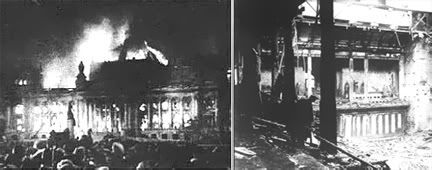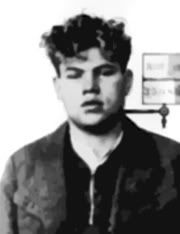Then, just 28 days after Hitler was appointed chancellor, on the night of February 27, the Reichstag, the home of the parliamentary government, was gutted by a massive fire, and Germany would never be the same again. The Reichstag building was empty, in recess since December and awaiting reopening for the election. Hitler was dining with Goebbels when Goebbels (soon to be Propaganda minister) got a call – the Reichstag was on fire. Thinking it an exaggeration, he ignored it at first, but then followed up and found out it was for real. President Hindenburg was dining with Vice-Chancellor Franz Von Papen, just around the corner from the Reichstag at the exclusive Herrenklub and could actually see the glow from the fire. All raced to the scene. Goering was already there, shouting “this is a Communist crime against the new government! This is the beginning of the Communist Revolution! We must not wait a minute. We will show no mercy. Every Communist official must be shot, where he is found.” [2]
 |
At 9:15 PM smoke was seen pouring from the building, and ten minutes later, as the first firemen arrived on the scene, the fire was raging out of control. At 9:30 there was a “tremendous explosion” and the huge central chamber was filled with flames. The fire quickly raced out of control, and left standing only a gutted shell of the building. [3] The attack killed no one, but certainly provided a shocking symbol of destruction and national vulnerability that changed the tone of election week dramatically.
 |
But while they bought his admission, Nazi officials refused to believe Van Der Lubbe acted alone. This Goering and the others stressed; after all, this was the “beginning of the Communist Revolution,” so clearly he had to have supporters. A local branch of the Comintern (Communist International) was implicated as the conspiracy probe widened, though the Leipzig Supreme Court was able to establish no connection between the Comintern delegates and the actual crime. [4] But such minutiae escaped much of the German public, for whom the nature of the threat was obvious. The solution – the Nazi way – also became obvious to more people than ever as the March 5 election drew near. Either way, Hitler and his disciples decided, this time they would have their coveted majority. Either he would win, or they would go ahead with their coup.
With this contingency plan in mind, the Nazis played fast and loose with the political rhetoric. On March 3, just two days before the election Goering delivered a rousing campaign speech in which he promised the voters “my measures will not be crippled by any judicial thinking… I don’t have to worry about justice; my mission is only to destroy and exterminate, nothing more! …Certainly I shall use the power of the state and the police to the utmost, my dear Communists, so don’t draw any false conclusions; but the struggle to the death, in which my fist will grasp your necks, I shall lead with those down there – the Brownshirts.” [5] While this likely lost him some Communist votes, he probably had the Brownshirt vote locked up after that speech, and when the election came around, the National Socialist Party managed to take 52% of the seats.
Sources:
[1] Shirer, William. The Rise and Fall of the Third Reich: A History of Nazi Germany. New York. Crest Books. 7th Printing. July 1965. Page 267. [2] Page 268.
[3], [4] Swigart, Soren. “The Reichstag Fire.” The World at War. http://worldatwar.net/event/reichstagsbrand/
[5] Nazi Conspiracy and Aggression Volume IV. Document No. 1856-PS. http://www.yale.edu/lawweb/avalon/imt/document/nca_vol4/1856-ps.htm
No comments:
Post a Comment